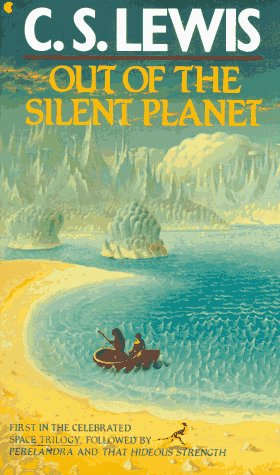 When Doctor Elwin Ransom went on a spontaneous walking tour of rural England, he wasn’t expecting to be kidnapped by a mad scientist and taken to Mars. He soon escapes, only to find himself lost without any way to return home.
When Doctor Elwin Ransom went on a spontaneous walking tour of rural England, he wasn’t expecting to be kidnapped by a mad scientist and taken to Mars. He soon escapes, only to find himself lost without any way to return home.
Fortunately, the native Martians soon take him in, teaching the otherworldly stranger of their peaceful, utopian ways. They are just as astonished to have a visitor from Earth as Ransom is astonished to be their guest. To them, Earth is a silent planet–the only world with no spiritual connection to the rest of the universe.
The more Ransom learns about the gentle people of Mars, the more he realizes that something evil lurks in the heart of our world–and that contact between the worlds can only hasten the showdown between the forces of good and evil.
I decided to read this book after chatting with Norman Cates at Worldcon 2011, following the “When Faith and Science Meet” panel. Some fascinating questions had popped up toward the end, especially regarding science fictional universes that are not incompatible with millenialist religions. Norman asked if I’d read C.S. Lewis’s Space Trilogy, and when I said that most people had told me it isn’t as good as Lewis’s other work, he kind of rolled his eyes and said that it was worth checking it out and deciding for myself.
Well, I didn’t get around to reading it until this summer, but I’m glad I did. It’s a short read, no more than 180 pages or so, and I finished it in a couple of days. The world it describes is quite fascinating–a fantastical version of Mars that I’d actually like to visit, perhaps even more than Bradbury’s and Burrough’s. The kidnapping in the beginning was compelling enough to hook me, but it was the immersive feel of the world that really made the book for me.
This being C.S. Lewis, the more spiritual and allegorical elements of the story lie fairly close to the surface, but it didn’t detract much from the reading experience for me. It became fairly obvious towards the end that the whole story is basically an attempt to incorporate the Christian millenialist mythos into a mainstream science fictional setting, which is probably where most of the criticism comes from. If you know that up front, however, and are willing to go along with it, it shouldn’t take much away from the story. In fact, that might just be what draws you to it.
It’s interesting, because Orson Scott Card tried to do something very similar with the story of Lehi in his Earthbound series, and I think he actually failed where Lewis succeeded. When I read A Memory of Earth, I felt that Card actually lost the best parts of both the Book of Mormon mythos and his own science fictional world by trying to force them together. In contrast, Out of the Silent Planet feels much more coherent and compelling, and not artificial at all.
I do feel like things sped up a bit too much at the end, though. The experience became a little less immersive for me when Lewis went from describing the alien world to bringing the millenialist themes to the forefront. It’s almost as if the focus of the book itself shifted, and that was a little bit jarring. I’m a big fan of metaphor, but allegory is a more difficult pill for me to swallow.
That said, I enjoyed the book, and am definitely interested in finishing the rest of the trilogy. It’s got a lot of merit to it, and is definitely worth checking out no matter what the critics may say.